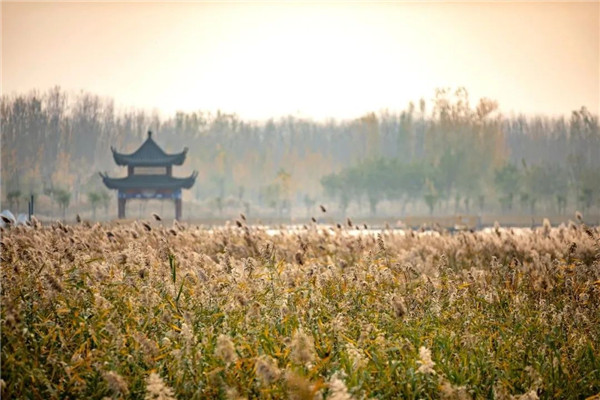President's economic thought promotes local development
Rural revival
In June 2003, Xi, then-secretary of the CPC Zhejiang Provincial Committee, initiated the Green Rural Revival Program. He planned to renovate about 10,000 incorporated villages in the next five years and transform about 1,000 central villages among them into examples of moderate prosperity in all respects.
Ahead of the Chinese Lunar New Year in 2003, Xi visited Hengkantou village, located at an old revolutionary base in Yuyao city, Zhejiang.
During a discussion, he said, "Only when people in old revolutionary base areas become rich can Zhejiang truly achieve common prosperity. Only when people in old revolutionary base areas live a well-off life can Zhejiang truly turn into a well-off society in an all-around way."
With promotion of the Green Rural Revival Program, Hengkantou village, once impoverished and backward, became a well-off and civilized village by developing red tourism, which refers to visiting historical sites with revolutionary legacies, and using green resources.
On March 1, 2018, more than 2,000 villagers in Hengkantou received a reply from the Party's top leader. The villagers wrote a letter to Xi on Feb 10, telling him about the latest development in the village, but didn't expect him to reply so soon.
Although 15 years had passed, Xi had always been concerned about the villagers and was pleased with the development of Hengkantou.
Great changes have also taken place in Xiajiang village, Chun'an county, 300 kilometers from the provincial capital Hangzhou, and also a grassroots work base for Xi when he worked in Zhejiang. He went to Xiajiang four times for investigation and wrote letters twice to encourage villagers.
Adhering to the concept of green development, Xiajiang has changed from being "dirty, chaotic and poor "to become "green, wealthy and beautiful." Per capita disposable income in the village in 2021 reached 46,959 yuan (about $6,800), more than 20 times that of 20 years ago.
"The great changes in the small mountain village benefited from Xi's care and the strategy of 'making full use of eight advantages and implementing eight major measures,'" said Jiang Lijuan, Party chief of Xiajiang, and a delegate to the 20th CPC National Congress.
The strategy, put forward by Xi in 2003, called on the province to make use of its eight advantages, such as system and mechanism advantage, location advantage and industry advantage, to implement eight major measures for Zhejiang's development.
Guided by the strategy, the Green Rural Revival Program, Mountain-Sea Collaboration Project, and other projects were implemented successively in Zhejiang.
A large number of poor mountain villages have become ecological and well-off by using green resources, expanding agriculture based on unique local features, and cooperating with developed districts and counties for development. More and more villagers are enjoying better lives.
In 2015, Zhejiang became the first province in China to complete the task of poverty alleviation at a high level.
In the past 10 years, the income gap between urban and rural residents in Zhejiang has narrowed from 2.37 fold to 1.94 fold, and the gap between the highest and lowest incomes of local residents has narrowed from 1.76 fold in 2013 to 1.61 fold.
During Xi's tenure in Zhejiang, he pointed out that there should be no blind spots in the modernization drive, and not a single village, town, or person should be left behind in the pursuit of moderate prosperity in all respects.
Xi has been committed to the concept of "not a single person should be left behind" throughout his work, whether it's winning the battle against poverty, building a moderately prosperous society in an all-around way, or promoting common prosperity steadily.



 Embark on cultural trip in Shandong
Embark on cultural trip in Shandong Global civilizations shine at Nishan in Shandong
Global civilizations shine at Nishan in Shandong Explore Taishan Mountain's autumn splendor
Explore Taishan Mountain's autumn splendor

